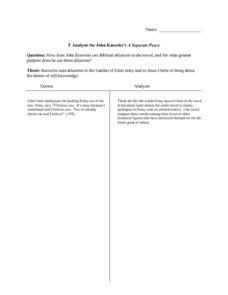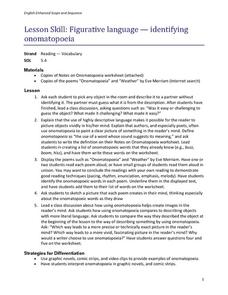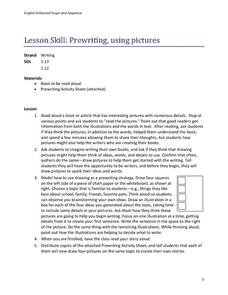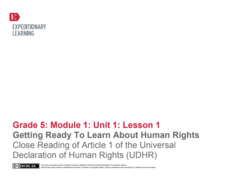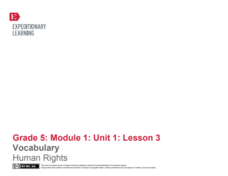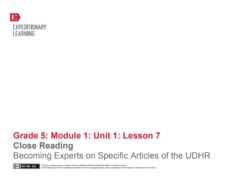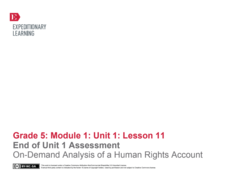Curated OER
A Separate Peace - T Analysis
Reading A Separate Peace? Readers analyze important quotes that appear in John Knowle's classic novel using the provided graphic organizer. Learners record a passage and provide an accompanying analysis for each entry. Consider...
Curated OER
Comprehension: Charlie and the Chocolate Factory
If your class will be reading Charlie and the Chocolate Factory, this guided reading worksheet may increase their comprehension. It asks them to re-read passages (provided) from the book and then answer numerous short answer questions. A...
Curated OER
Writing the Essay
Relate the structure of the essay to the structure of a building. The class compares an essay to a building, with the writer being the architect, the introduction being the foundation, and so on. They use the visual representation of a...
Curated OER
Know Before You Go: Anticipating and Previewing Difficult Texts such as The Bluest Eye
Support your scholars with these anticipatory questions to go along with The Bluest Eye by Toni Morrison. The objective, rationale, and teacher instructions are clearly explained, followed by an anticipation guide for pages 81-93 and the...
Curated OER
ASL Lesson 18
Have a discussion, review nouns, and practice speaking using ASL. Lesson 18 of 30+ extensive lessons on using American Sign Language covers classifiers, coded English, and asking questions. Each link embedded in the lesson provides a...
Curated OER
Figurative Language- Identifying Onomatopoeia
A study of onomatopoeia for 5th graders is here for you. Pupils discover that the use of highly descriptive language makes it possible for readers to picture objects in their minds. After engaging in a class discussion and listening to...
Curated OER
Prewriting, Using Pictures
Young readers practice getting information from both the text and the illustrations found in books they are reading. They see that quite often, authors use pictures to help them get their writing process started. Youngsters are invited...
EngageNY
Talking with My Peers: Carousel of Reading Superheroes Around the World
In many places in the world, people go to great lengths to get books to read. This beginning-of-the-year activity uses pictures of people reading in extraordinary situations to stimulate effective listening and speaking using the...
EngageNY
Getting Ready to Learn About Human Rights: Close Reading of Article 1 of the Universal Declaration of Human Rights (UDHR)
Introduce young readers to informational texts with a well-designed, ready-to-use, and Common Core-aligned unit. Young readers learn a variety of skills while studying the Universal Declaration of Human Rights (UDHR). As the first...
EngageNY
Close Reading: The Introduction to the Universal Declaration of Human Rights
As part of a group of lessons, your class will return to the primary text for this unit, the Universal Declaration of Human Rights. Key vocabulary as well as close reading strategies continue to be the focus skills; however, this lesson...
EngageNY
Vocabulary: Human Rights
Your class continues to explore the history of the Universal Declaration of Human Rights. In addition to learning about the background of this text, learners work on the skill of identifying and understanding key academic vocabulary....
EngageNY
Mid-Unit 1 Assessment: Human Rights Vocabulary and Common Prefixes
Here is a mid-unit assessment for a group of lessons studying the Universal Declaration of Human Rights (UDHR). The first half of this instructional activity calls for several forms of review. Your class will review the content of the...
EngageNY
Close Reading: Unpacking Specific Articles of the UDHR
Lesson 6 of this extensive unit finally has your class begin to work their way through specific articles from the text of the Universal Declaration of Human Rights (UDHR). Before examining the rights actually detailed in the...
EngageNY
Building Background: A Short History of Human Rights
Before continuing to read the Universal Declaration of Human Rights, learners need to understand why and how this document was written. First, show and discuss a video from UNICEF to demonstrate the need for such a document. Then...
EngageNY
Close Reading: Becoming Experts on Specific Articles of the UDHR
A continuation of the previous instructional activity, which is part of a larger group of lessons on human rights (see additional materials). Here, in Lesson 7, your class will explore more articles from the Universal Declaration of...
EngageNY
Informative Paragraph Pre-Assessment: What Is One Reason You Want the Power of Reading?
This writing pre-assessment has minimal instruction but maximum support and encouragement. It begins with a review of the book, Rain School, through a think-pair-share and small group discussion. The discussion...
EngageNY
Summarizing Complex Ideas: Comparing the Original UDHR and the "Plain Language" Version
The eighth lesson plan in this series continues the focus on vocabulary and increasing young readers' awareness of academic language. Pairs of learners participate in a short vocabulary review activity called Interactive Words in which...
EngageNY
Main Ideas in Informational Text: Analyzing a Firsthand Human Rights Account
Although this is part of a series, lesson plan nine has your class take a break from their close study of the Universal Declaration of Human Rights (UDHR) text to read the firsthand account “Teaching Nepalis to Read, Plant, and...
EngageNY
Main Ideas in Informational Text: Analyzing a Firsthand Human Rights Account for Connections to Specific Articles of the UDHR
Lesson 10 in a series of human rights lessons focuses on the skills of finding evidence and summarizing. Your young readers work to compare the two texts they have read in this unit: the Universal Declaration of Human Rights...
EngageNY
Building Background Knowledge: Learning About the Historical and Geographical Setting of Esperanza Rising (Chapter 1: “Aguascalientes, Mexico, 1924”)
Set up your class to read Esperanza Rising, by Pam Muñoz Ryan, through a class read-aloud and exploration of the setting. The detailed instructional activity outlines each step. First, class members read over the first few pages and...
EngageNY
End of Unit 1 Assessment: On-Demand Analysis of a Human Rights Account
The last instructional activity in this unit about human rights consists of a final assessment. To demonstrate the skills your class has acquired throughout this unit, they will work with a new article entitled "From Kosovo to the United...
EngageNY
Getting to Know Esperanza (Chapter 2: “Las Uvas/Grapes”)
Delve into Esperanza Rising by Pam Muñoz Ryan with close reading and evidence-based, text-dependent questions. Part of a unit series, this well-sequenced, Common Core designed instructional activity draws on material from the...
EngageNY
Inferring About Characters Based on How They Respond to Challenges (Chapter 4: "Los Higos/Figs")
How do you know what a character's personality is like if an author doesn't tell you? With a focus on character development in Esperanza Rising, pupils complete a jigsaw activity to analyze the actions of Mama, Abuelita, and Miguel. Once...
EngageNY
Contrasting Two Settings (Chapter 6: "Lost Melones/Cantalouples")
Continue working through Esperanza Rising, by Pam Munoz Ryan, by looking into language choices and discussing text-dependent questions. Pupils converse in small groups and as a class about plot, setting, and figurative language. Using...
Other popular searches
- English Grammar
- English as a Second Language
- English Language Arts
- Nets Force English
- English Usage
- Future Tense English Grammar
- English Literature
- English Explorers
- English Language
- English Grammar Worksheets
- English Law
- English Civil War


